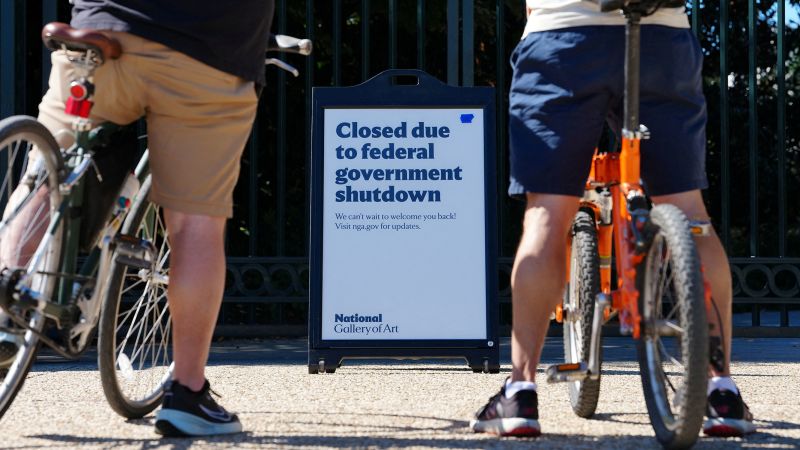Analysis: Four ways the government shutdown could end
The government shutdown is barreling forward, with few signs of a resolution over the weekend.
It’s normal for these shutdowns to feel intractable, right up until the moment one side suddenly caves. But the dynamics here are unusual and suggest this one could last longer than usual.
With that in mind, here are the ways it could ultimately come to an end.
The Democrats fold
This might be the most likely outcome, for a few reasons.
The first is that it’s generally how shutdowns end; the side that makes demands rarely gets what it wants, because the American people overwhelmingly don’t like using shutdowns as leverage.
The second is that we’ve already seen some cracks in the Democratic front. Three senators from the Democratic caucus have voted for the GOP’s so-called “clean” continuing resolution. If five more get cold feet about the whole thing, Democrats can’t maintain their filibuster.
And the third is that this could get increasingly painful for Democrats. While early polling has shown significantly more Americans blame Trump and the GOP, that’s not normal, given it’s Democrats who have withheld their votes.
It seems quite possible that as things drag on and real world impacts become more tangible – think: military members missing paychecks on October 15 – Americans might lose patience with the Democrats’ gambit, even as they’re quite sympathetic to the policy goal of extending enhanced Obamacare subsidies.
Also an x-factor here are the threats the administration is making to target blue states and programs Democrats like. Remember that fear Trump could impose lasting change was perhaps the main reason Democrats gave up during the last government-funding showdown this year.
“I believe allowing Donald Trump to take even much more power via a government shutdown is a far worse option,” Senate Minority Leader Chuck Schumer of New York said back in March.
There is some uncertainty about how far the administration will go to back up those threats, with some Republicans cautioning against it and worrying it would damage the GOP’s political standing.
But time isn’t necessarily on Democrats’ side. There’s a real question about how strongly Americans will insist on extending those enhanced Obamacare subsidies now, especially given it’s possible to do it later (albeit when Democrats will have less leverage).
A deal for future Obamacare debates
This seems the most likely way in which Democrats get something out of the shutdown.
It wouldn’t be that Republicans would give them everything they want in the government funding bill. But perhaps Republicans would make some guarantees about future debates over extending the enhanced Obamacare subsidies.
Republicans seem to have political reason to extend those subsidies at some point and in some form, after all. A KFF poll on Friday showed 78% of Americans and even 57% of MAGA Republicans supported extending the subsidies. Trump’s own pollster, Tony Fabrizio, has strongly urged the party to extend them and warned about electoral problems if they don’t. Many who benefit from the subsidies come from red states.
The GOP quite notably hasn’t ruled out extending these subsidies. In fact, its leaders have repeatedly emphasized that they’re willing to negotiate, as long as the resolution includes some reforms of the subsidies. They have just said those negotiations are for a later date, when the shutdown has ended.
“What I’ve said is I’m open to having conversations with our Democrat colleagues about how to address that issue,” Senate Majority Leader John Thune of South Dakota said Friday. “That can’t happen when the government is shut down.”
We’ve also seen some GOP senators who support the subsidies float proposals on the issue, and they could bring pressure to bear on their side.
It also wouldn’t be too surprising to see Trump get on board with this option to end the shutdown. While he campaigned hard against Obamacare, he’s generally not as bothered by ballooning deficits as other members of his party are.
That said, there’s reason to be skeptical of this option. Democrats say assurances about future talks aren’t sufficient. And Republicans say negotiations can only happen after the government is reopened; they haven’t signaled a willingness to set the boundaries of future talks now.
This could also be a tough pill for Republicans to swallow, depending on how significant the guarantees would be, given it would represent at least a partial victory for Democrats – and reward their gambit.
A different GOP concession
The Obamacare subsidies are the most likely concession, given the political dynamics described above.
But they’re not the only potential bargaining chip here.
Democrats have also said part of the reason they don’t want to fund the government is that they have no faith in the Trump administration and Republicans will actually abide by the terms of whatever is passed.
The administration has repeatedly moved to simply void congressionally authorized government spending and otherwise ignored Congress’s will.
Congressional Republicans have also begun playing a role in that, too, through the “rescissions” process. Basically, Republicans are canceling spending that required bipartisan agreement and 60 votes (because of the filibuster) using simple, partisan majorities (because rescissions aren’t subject to the filibuster). If you’re Democrats, why pass anything knowing it’s subject to what’s effectively a partisan veto at a later date?
Perhaps Democrats could push for something to rein all that in. But it’s hard to see precisely what that could be or how the administration would agree, given how central these maneuvers are to Trump’s power plays.
Or perhaps Democrats could get some other concession that could help them at least save face and feel comfortable voting to open the government back up.
None of that seems likely. It’s just worth emphasizing the Obamacare subsidies aren’t the only thing in play.
Republicans cave
This is probably the least likely option. It’s got basically no recent precedent.
But let’s say, for argument’s sake, that Democrats keep driving a hard bargain, and Republicans wind up just giving them what they want. How would that come about?
It could conceivably come about if the shutdown drags on but polling shows Americans continue to blame Trump and the GOP more. Perhaps Americans are just that insistent about extending the Obamacare subsidies, and Democrats hold out for something more concrete than promises about future debates.
Perhaps Republicans become wary of the shutdown making it look like they want to strip these enhanced Obamacare subsidies away from millions of Americans.
Perhaps Trump simply loses patience with the whole thing and decides this is a relatively modest concession – given Republicans might ultimately do it anyway.
Or perhaps the administration goes too far with its retributive cuts to government, and the whole thing blows up in its face, as some Republicans are warning.
Again, this seems unlikely. And it would amount to a monumental shift in the power dynamics in Washington. That would seem to be enough for Trump to do everything possible to resist giving in.
Share this content:











